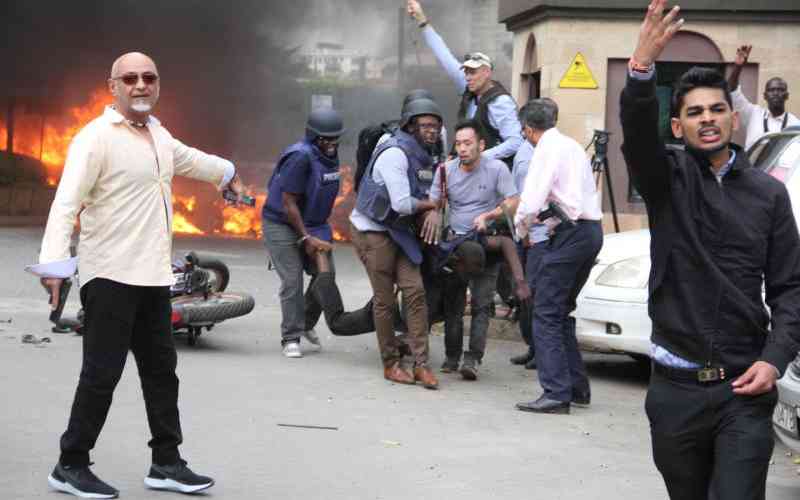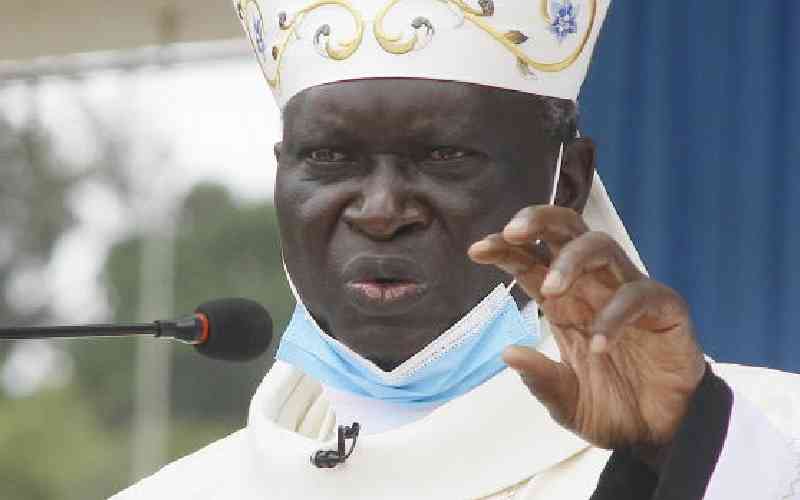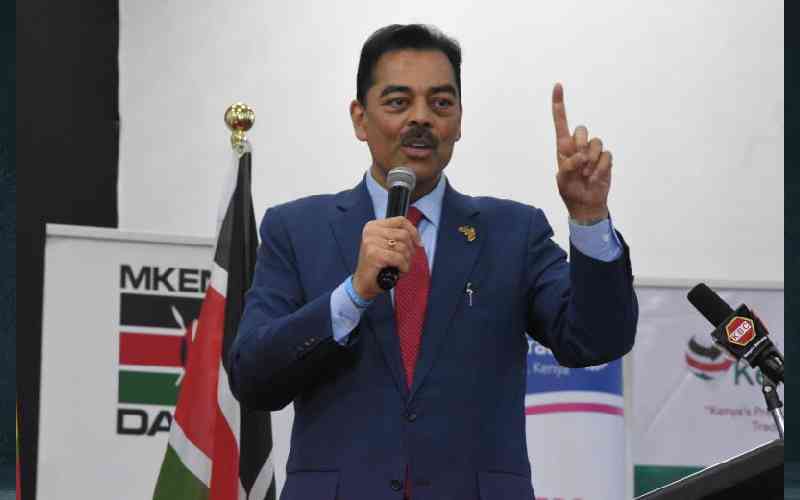By Standard Reporter
The Standard Group has moved to set the record straight regarding a five-month investigative piece by its award-winning investigative journalists aired on KTN last month.
The three-part series, ‘Port of Impunity’ for KTN Prime and ‘Zengwe Zengwe Bandarini’ for KTN Leo, won praise countrywide for helping in the fight against corruption and identifying weaknesses in duty collection.
However, the principal tax collector, the Kenya Revenue Authority, has taken exception with the story and claims it slandered its staff. |
KTN’s exposÈ on tax evasion has ruffled feathers among Kenya Revenue Authority and Mombasa port officials. Photo: Boniface Okendo/Standard |
The taxman on December 11 and December 18 published a rejoinder in the dailies, saying no staffer had been taped doing anything illegal.
But on Tuesday, KTN gave a detailed, blow-by-blow response in which it maintained it stood by the series.
In its rejoinder, KRA insisted full duty was paid for container FSCU 6694823 that had, among other goods, spare parts imported by KTN’s investigative journalists. According to KRA, the amount collected was Sh2,270,958 — which included "additional tax and penalties".
It went on to admit, as reported in the KTN story, that there was an attempt to defraud through tax evasion.
Said KRA: "A clearing agent registered the entry for FSCU 6694823 on October 29 who declared two items; namely 200 cartons of drinking water packed in 1.5 litre bottles and 160 cartons of hair-cut kits. The agent also lodged an invoice for $4,120 as the total value of the goods and assessed the tax payable as Sh196,997."
The KRA staff, however, were "unsatisfied" and went ahead to conduct a full inspection and "established that the correct value of the goods therein was $57,613.40 and not $4,120 as assessed and self-declared by the clearing agent".
It was then that it "demanded and received additional taxes and a penalty of Sh300,000, resulting in Sh2,270,958 payment".
Yet KRA’s explanation — in which it railed at the station for "tarnishing the authority’s image using information based on hearsay and fabrications" — raised more questions than answers. At what stage did KRA carry out the 100 per cent verification?
More money
KTN got its goods in Nairobi after paying Sh41,000 instead of the nearly Sh200,000 payable in duties. How is it possible that the importer could have subsidised or favoured the said goods by more than 75 per cent when they were not even known to the consignee? Why didn’t the importer demand more money from KTN?
Stay informed. Subscribe to our newsletter
So who is fooling who? Documents from KRA, which are in KTN’s possession, show a glaring discrepancy.
Whereas the inspection document is dated November 12, another document with remarks raising the duty figure from $4,120 to $57,613.40 was dated November 7, a whole five days earlier.
So how is it possible that the amount of tax payable was determined even before the controversial container was "fully inspected"? Further, were the said duties levied upon actual verification or upon presumption of duty?
Is it possible the said 100 per cent verification never happened? And is it also possible that the actual value of goods in the container could have been higher, and hence duty payable more than the Sh2.27 million realised according to KRA? And if indeed it is true that the company in question has always paid its duties, how come KRA has stopped them?
What is the status on this matter? KTN said its further investigations had revealed those who had been benefiting from the illicit activities at the port were now hurting, following the expose.
KTN explained that the story was in no way aimed at demonising KRA as an organisation and its staff, but testing and highlighting the leakages of revenue within the system, as executed by import and clearing agents, in cahoots with some gullible port and KRA staff.
"These are incontrovertible facts and the least KRA could have done was liaise with the media to stop the corruption, which it admits in its article is alive and kicking," said KTN.
The station said it was aware the authority had invested in an X-ray machine, and sought to know whether information relating to the said container was stored in a database as proof of its contents.
False declarations
Further questions are: What other action, apart from levying penalties, has been taken against the agents who made false declarations regarding the consignment? Have they been charged with falsification of documents with intent to evade duty?
Indeed, as a country, we should be asking ourselves why anyone should be importing mineral water. What are the current duties applicable to this commodity and are they enough to discourage imports?
The station also challenged the tax authority to provide specific itemisation of the container’s contents, and prove how tax was computed to arrive at the Sh2.27 million.
KTN said it recognised revenues to State coffers had risen owing to the good job of some professional management and staff members, but that if KRA were indeed serious about fighting corruption, they would be collaborating with the media.
The TV station said it was encouraged some arms of Government were already recognising the media’s role in the fight against corruption and tacitly acknowledged this.
The station, however, raised concern over a practice where institutions have in the past reacted to not-so positive coverage by stopping advertising.
"In the past, institutions have reacted by withdrawing advertising or denying us what is due to us; we trust they are wiser now," said the station.
In its rejoinder, KRA had said the "anti-climax" of the KTN series was that there was no KRA staff caught on camera receiving bribes.
"KRA’s Commissioner-General Michael Waweru was avid to see his officers receiving bribes on tape, with a view to authorising their immediate dismissal," KRA said.
Ill-gotten gains
But on Tuesday, KTN made it clear the series was not about catching anybody receiving bribes — the corrupt have become sophisticated and receive their ill-gotten gains in various ways and forms — but about testing the system to ensure it was foolproof, through an institutional audit.
Indeed, if sackings were to end corruption, KRA’s own admission that it had parted ways with 250 employees since 2005 should have been more than enough, it added. And we quote: "KRA has been ruthless in dealing with corruption; it parts ways with an average of 50 employees every year on corruption and fraud-related issues since 2005, but we must appreciate there is no institution that can uproot this monster without the participation of all stakeholders. After all, it takes two to tango."
"Well said, Mr Waweru, but why the hostility if indeed ‘participation of all stakeholders’ is what it takes to uproot the monster?" the station posed.
And it added: "KRA is well advised not to be in a state of denial as the matter in question touches on the core system of revenue collection. Neither is it a wholesale condemnation of the entire revenue body, nor for that matter, the person of the Commissioner-General, nor will it be the last time that such discrepancies will be detected.
The station went on: "But this must remain a collective challenge for which all stakeholders, including the media, must seek to confront."
KTN made it clear that how the matter would eventually be settled would rest on how KRA chooses to progress it.
"But ours is to remain resolute in highlighting these matters of compelling national interest for those in authority to choose to act," the station concluded.
 The Standard Group Plc is a
multi-media organization with investments in media platforms spanning newspaper
print operations, television, radio broadcasting, digital and online services. The
Standard Group is recognized as a leading multi-media house in Kenya with a key
influence in matters of national and international interest.
The Standard Group Plc is a
multi-media organization with investments in media platforms spanning newspaper
print operations, television, radio broadcasting, digital and online services. The
Standard Group is recognized as a leading multi-media house in Kenya with a key
influence in matters of national and international interest.
 The Standard Group Plc is a
multi-media organization with investments in media platforms spanning newspaper
print operations, television, radio broadcasting, digital and online services. The
Standard Group is recognized as a leading multi-media house in Kenya with a key
influence in matters of national and international interest.
The Standard Group Plc is a
multi-media organization with investments in media platforms spanning newspaper
print operations, television, radio broadcasting, digital and online services. The
Standard Group is recognized as a leading multi-media house in Kenya with a key
influence in matters of national and international interest.






